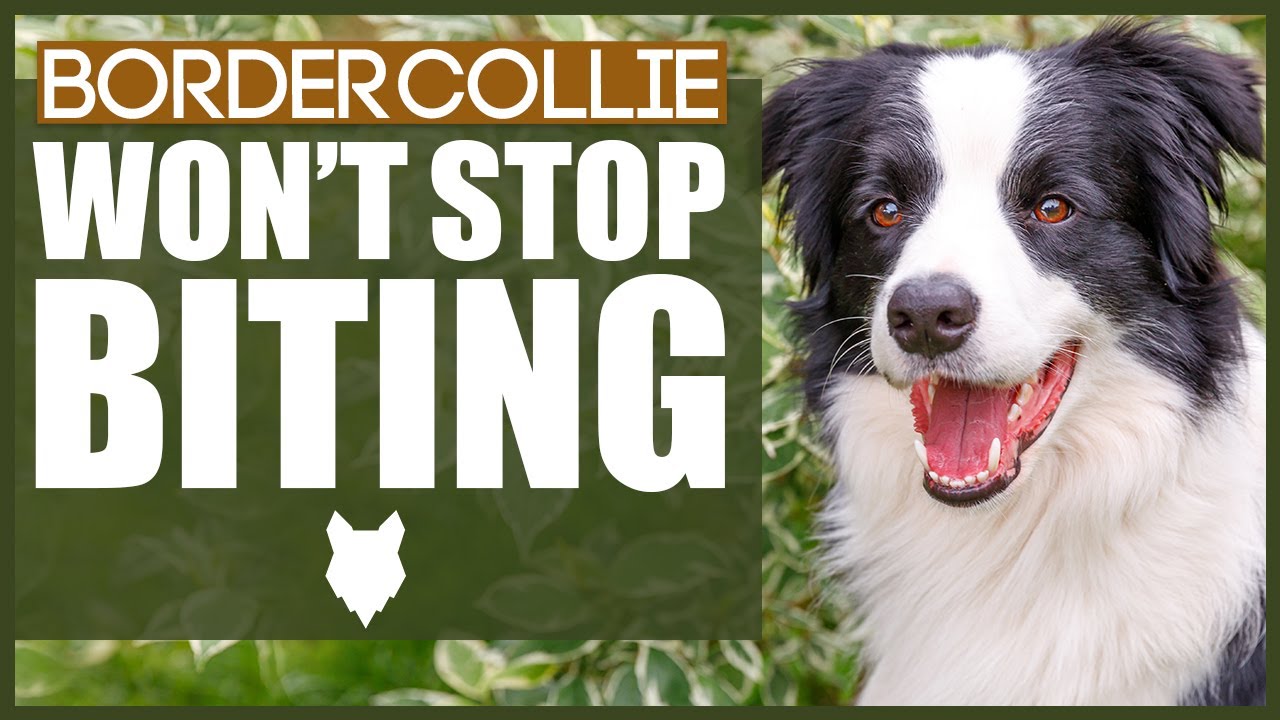Dealing with a Border Collie puppy that won’t stop biting can be stressful. You might wonder why your adorable pup is turning into a little nipper.
Border Collie puppies are known for their energy and intelligence. This breed loves to work and play. But their playful nipping can become a problem. It’s important to understand why they bite and how to manage it. Puppies bite for many reasons.
They might be teething, playing, or seeking attention. With the right guidance, you can teach your Border Collie to stop biting. In this blog, we’ll explore why your puppy bites and simple steps to curb this behavior. Let’s make sure your journey with your Border Collie is joyful and bite-free.
Common Reasons For Biting
Border Collie puppies are adorable, but their biting can be challenging. Understanding why they bite helps manage this behavior. Here are common reasons for their biting habits.
Teething Phase
Puppies, like human babies, go through a teething phase. During this time, their gums feel sore. Chewing helps soothe their discomfort. They might bite your fingers, furniture, or anything they find. It’s a natural process for their growing teeth. Providing appropriate chew toys can help reduce biting.
Playful Nature
Border Collies are energetic and playful. They often use their mouths to explore and interact. Biting during play is common among puppies. It’s their way of learning and having fun. Teaching them gentle play is important. Redirect their biting with toys and praise good behavior. This helps them understand what is acceptable.
Puppy Teething Solutions
Puppy teething can be a challenging phase for both you and your Border Collie. Their need to chew and bite everything in sight can be frustrating. But, understanding their teething needs and providing the right solutions can make this phase easier. Here, we will explore some effective puppy teething solutions.
Chew Toys
Chew toys are essential for a teething Border Collie puppy. They help soothe sore gums and keep your puppy entertained. Choose durable toys made from safe materials. Rubber and nylon toys are excellent choices. Toys with different textures can also provide added relief. Always supervise your puppy while they chew to ensure safety.
Frozen Treats
Frozen treats can be a great way to ease your puppy’s teething pain. The cold helps numb their gums and reduce discomfort. You can freeze puppy-safe fruits like blueberries or apple slices. Ice cubes made from water or broth are also good options. Remember to monitor your puppy while they enjoy these treats to prevent choking.
Training Methods
Training a Border Collie puppy to stop biting can be a challenge. These intelligent dogs need consistent training methods to help them learn proper behavior. Here are some effective techniques to guide you through the process.
Positive Reinforcement
Positive reinforcement is a powerful tool in training Border Collie puppies. Reward your puppy for good behavior. Use treats, praise, or a favorite toy. This encourages them to repeat the behavior.
Follow these simple steps:
- Give a treat when your puppy stops biting.
- Praise them with a happy voice.
- Repeat this consistently.
Consistency is key. Your puppy will learn that biting does not bring rewards, but stopping does.
Redirection Techniques
Redirection techniques help divert your puppy’s biting to a more appropriate object. Offer them a chew toy when they start to bite. This teaches them what is acceptable to bite.
Here is a simple method to follow:
- Keep a toy handy during playtime.
- When your puppy bites, say “No” firmly.
- Immediately give them the chew toy.
- Praise them when they start chewing the toy.
These techniques help your puppy understand that biting people is not allowed. Instead, they learn to chew on their toys.

Credit: www.doggoneproblems.com
Socialization Importance
Border Collie puppies are energetic and playful. Sometimes, they bite a lot. Socialization can help reduce this behavior. It teaches them how to interact with others. Here’s why socialization is crucial for your Border Collie puppy.
Meeting Other Dogs
Meeting other dogs helps your Border Collie learn good manners. They learn how to play without biting. This is crucial for their social skills.
Here are some tips for introducing your puppy to other dogs:
- Start with calm and friendly dogs.
- Keep the first meetings short.
- Reward your puppy for good behavior.
Regular interactions with other dogs help reduce biting. They learn boundaries and respect.
Exposure To New Environments
Taking your puppy to new places is important. They need to experience different sights, sounds, and smells. This helps them become confident and well-behaved.
Consider these environments for your puppy:
- Parks
- Pet-friendly stores
- Busy streets
A confident puppy is less likely to bite out of fear. Exposing them to new environments helps them feel secure.
Exercise And Mental Stimulation
Border Collie puppies are known for their high energy and intelligence. This combination can sometimes lead to unwanted behaviors such as biting. To address this, it’s crucial to provide them with enough exercise and mental stimulation. This will help manage their energy levels and keep their minds occupied.
Daily Walks
Daily walks are essential for your Border Collie puppy. These walks help burn off excess energy and provide mental stimulation. Aim for at least two walks per day, each lasting about 30 minutes. Vary the routes to keep things interesting for your puppy.
During these walks, allow your puppy to explore different smells and sights. This sensory stimulation is crucial for their mental development. You can also incorporate some basic training exercises during the walk, such as sit, stay, or heel.
Interactive Toys
Interactive toys can provide both physical and mental stimulation for your Border Collie puppy. These toys engage their natural instincts and keep them occupied. Puzzle toys, for example, require your puppy to solve a challenge to get a treat.
Here are some types of interactive toys that can be beneficial:
- Chew toys: These can satisfy their natural urge to bite.
- Treat-dispensing toys: These keep them busy and reward them with treats.
- Interactive puzzles: These challenge their problem-solving skills.
Rotate the toys regularly to keep your puppy interested. This prevents them from getting bored with the same toys.

Credit: www.youtube.com
Setting Boundaries
Setting boundaries for a Border Collie puppy is essential. Without rules, they may develop biting habits. Establishing clear boundaries helps your puppy understand acceptable behavior. Use consistent commands and time-outs to guide them. These techniques will create a safe and happy environment.
Consistent Commands
Using consistent commands is crucial. Choose simple words like “no” or “stop”. Ensure everyone in the household uses the same words. This consistency helps your puppy learn faster. Praise them when they obey. Positive reinforcement encourages good behavior.
Repeat commands calmly and firmly. Avoid shouting or getting frustrated. Your puppy responds better to a steady tone. Practice commands daily. Consistent training sessions reinforce their learning. Over time, they will understand and follow the rules.
Time-outs
Time-outs can be effective for controlling biting. When your puppy bites, say “no” and remove them from the situation. Place them in a quiet area for a few minutes. This teaches them that biting leads to isolation.
Be consistent with time-outs. Use them every time your puppy bites. Do not use their crate for time-outs. This should be a safe space, not a punishment area. After the time-out, reintroduce them calmly. Praise them if they behave well.
Regular time-outs help them understand boundaries. They learn that biting is not acceptable. Patience is key. Over time, your puppy will reduce their biting behavior.
Professional Help
Dealing with a Border Collie puppy that won’t stop biting can be frustrating. Sometimes, seeking professional help becomes necessary. Experts can offer valuable guidance and support. They can help curb your puppy’s biting behavior effectively and humanely. This section will cover two key professional avenues: dog trainers and veterinary advice.
Dog Trainers
Dog trainers specialize in behavior correction. They can teach your Border Collie puppy manners. Trainers use positive reinforcement to address biting. This method involves rewarding good behavior. It helps your puppy understand what is acceptable. Professional trainers often provide one-on-one sessions. These personalized sessions tackle specific issues. Group classes can also be beneficial. They offer socialization opportunities for your puppy. Interacting with other dogs can reduce biting. Your puppy learns proper play behavior from peers.
Veterinary Advice
Sometimes biting stems from health issues. Visiting your vet can rule out medical causes. Puppies might bite due to teething pain. Vets can recommend safe chew toys. These toys soothe their gums. Your vet might also suggest behavior specialists. These experts can work alongside trainers. They provide a comprehensive approach to problem behaviors. Regular vet check-ups ensure your puppy’s overall well-being. A healthy puppy is more likely to behave well.
Patience And Persistence
Patience and Persistence are essential when training a Border Collie puppy. These energetic pups are known for their intelligence and eagerness to learn. However, their natural herding instincts can lead to excessive biting. With consistent training and a lot of patience, you can help your puppy overcome this behavior.
Long-term Commitment
Training a Border Collie puppy requires a long-term commitment. These dogs need regular mental and physical stimulation. Their high energy levels mean they can get bored quickly, leading to unwanted behaviors like biting.
Creating a training schedule is crucial. Consistency helps your puppy understand what is expected. You can break the training into short, frequent sessions to keep your puppy engaged. Here’s a simple table to help plan your week:
| Day | Training Focus | Duration |
|---|---|---|
| Monday | Bite Inhibition | 15 minutes |
| Tuesday | Basic Commands | 20 minutes |
| Wednesday | Socialization | 30 minutes |
| Thursday | Bite Inhibition | 15 minutes |
| Friday | Basic Commands | 20 minutes |
| Saturday | Play and Exercise | 1 hour |
| Sunday | Rest Day | – |
Celebrating Progress
Progress might seem slow, but it’s important to celebrate small victories. Each time your puppy responds correctly, reward them with treats and praise. Positive reinforcement builds confidence and encourages good behavior.
Keep a journal to track your puppy’s progress. Note the improvements and areas needing more work. This helps you stay motivated and adjust your training methods as necessary.
Here’s what you might include in your training journal:
- Dates and times of training sessions
- Specific behaviors worked on
- Successes and challenges
- Notes on puppy’s mood and energy levels
Remember, patience and persistence will pay off. Your Border Collie will eventually learn to control their biting. Enjoy the journey and the bond you are building.

Credit: www.lovelybordercollie.com
Frequently Asked Questions
Why Is My Border Collie Puppy Biting?
Border Collie puppies often bite due to teething or exploring their environment. Biting is also a way they play and communicate.
How Can I Stop My Puppy From Biting?
Provide chew toys and consistently redirect biting to toys. Use positive reinforcement to reward gentle behavior.
Is Biting Normal For Border Collie Puppies?
Yes, biting is normal for puppies. It’s part of their development and teething process.
When Do Border Collie Puppies Stop Biting?
Most puppies stop biting as they mature. This typically happens around 6 to 7 months of age.
Conclusion
Biting is a common issue with Border Collie puppies. Patience and consistent training help. Redirect their energy with toys and activities. Use positive reinforcement to encourage good behavior. Set clear boundaries and stay firm. Consult a professional trainer if needed.
Your puppy will learn with time and effort. Enjoy the journey of raising a happy, well-behaved Border Collie.
